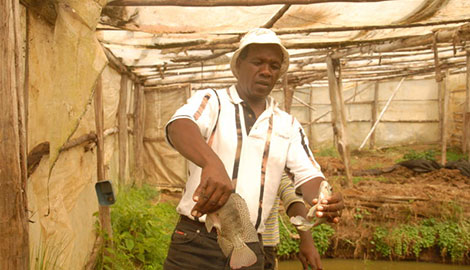Had Onesmus Githui realised during his 27-year tenure at Telkom Kenya that fish farming was a lucrative venture, he would have quit in his first year of employment. Today, the farmer who makes a high of Sh. 100,000 from his fish farm would be a millionaire.
Well, his fish project did so well in his first year of starting, he was amazed. “In the first six months after starting fish farming, I made a profit of Sh130,000. I was impressed,” he told Smart Harvest at his farm in Kairi village in Kabaru, in the foothills of Mt Kenya.
After quitting his job at Telkom Kenya, Githui moved to Naivasha where he opened a butchery and doubled up as a meat supplier. While at Naivasha, Githui developed interest in fish business, as he admired how fishermen worked overnight and buyers flocked the area in the morning to buy the stocks. “I realised they would spend whole night fishing, while buyers flocked the area near the lake in the morning. The stocks would be cleared by 11 am. I thought it was a good business,” he says. After two years engaging in meat business in Naivasha, Githui decided to leave for his home in Kabaru, Kieni, Nyeri County.
He engaged the services of fisheries officers and other fish farmers to teach him the trade. “I came back in 2010, and did my research. Afterwards I started digging ponds. Water is available in my area, so sinking the ponds was easy,” he says. Interestingly, Githui started rearing his fish — tilapia and cat fish — in green houses, which ensure the water in the ponds are warm enough to sustain them. When we toured his farm, we almost confused the quarter-acre investment for a horticultural venture. Githui has more than 14 ponds spread within the land, and which host about 65,000 fish which are at different stages.
“I started the project in 2010, and I spent about Sh20,000 to put up the ponds and procure fingerlings from Sagana aqua-farm in Kirinyaga. But within six months, I started making profit. My first big money was Sh150,000,” says Githui. When we visited his farm, Githui has placed between 60,000 and 100,000 eggs in his incubator, all of which were waiting to be collected by his customers.
After two years engaging in meat business in Naivasha, Githui decided to leave for his home in Kabaru, Kieni, Nyeri County. He engaged the services of fisheries officers and other fish farmers to teach him the trade. “I came back in 2010, and did my research. Afterwards I started digging ponds. Water is available in my area, so sinking the ponds was easy,” he says. Interestingly, Githui started rearing his fish — tilapia and cat fish — in green houses, which ensure the water in the ponds are warm enough to sustain them. When we toured his farm, we almost confused the quarter-acre investment for a horticultural venture.
Githui has more than 14 ponds spread within the land, and which host about 65,000 fish which are at different stages. “I started the project in 2010, and I spent about Sh20,000 to put up the ponds and procure fingerlings from Sagana aqua-farm in Kirinyaga. But within six months, I started making profit. My first big money was Sh150,000,” says Githui. When we visited his farm, Githui has placed between 60,000 and 100,000 eggs in his incubator, all of which were waiting to be collected by his customers.
“Breeding and selling fingerlings is more lucrative, since it is less tasking and the returns are good within a short while,” he says. Every month, the fish farmer says he pockets between Sh60,000 and Sh100,000 from the sale of both fingerlings and fish. At the moment, his only expenses are paying his two employees and purchase of fish supplements. He also feeds the fish on sweet potato vines and other vegetables.
His clientele include hotels, local farmers, hospitals and schools within the Mt Kenya region. “The fish market has not been exploited. I sell a kilogramme of fish meat at Sh350. The demand is crazy,” he says. He also sells each fingerling at Sh15, meaning that within two weeks, he would fetch between Sh0.9 million and Sh1.5 million from the eggs currently in the incubator. For the future, Githui plans to put up a fish resort in his father’s 50-acre land.








